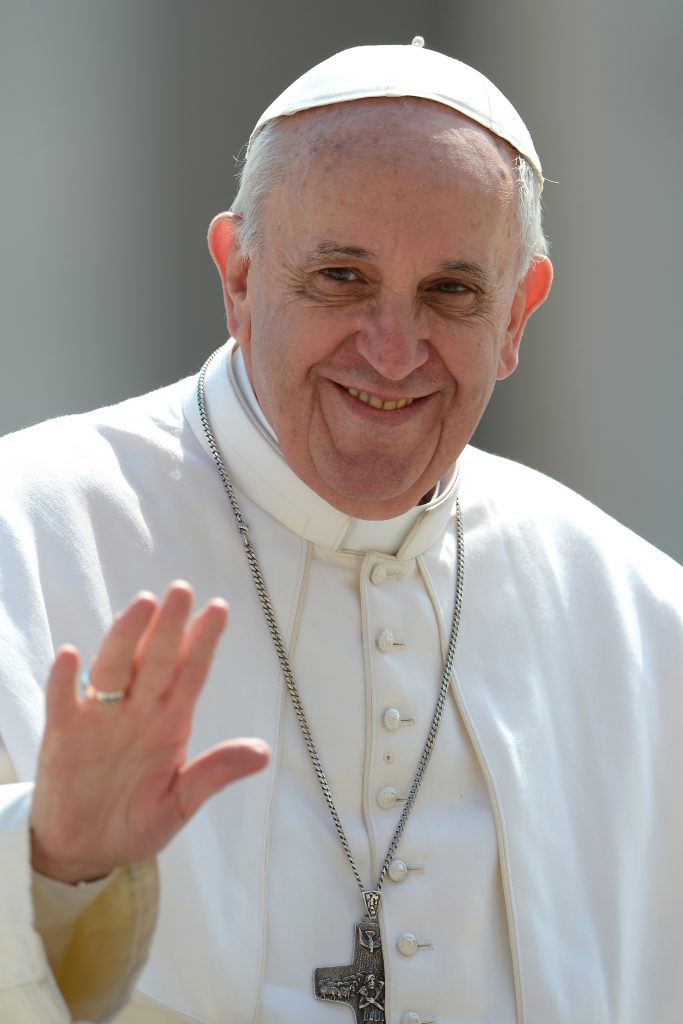“We cannot but speak about what we have seen and heard” (Acts 4:20)
World Mission Sunday will be on the 24th October 2021
The following is the message from His Holiness Pope Francis

Dear Brothers and Sisters,
Once we experience the power of God’s love, and recognize his fatherly presence in our personal and community life, we cannot help but proclaim and share what we have seen and heard. Jesus’ relationship with his disciples and his humanity, as revealed to us in the mystery of his Incarnation, Gospel and Paschal Mystery, shows us the extent to which God loves our humanity and makes his own our joys and sufferings, our hopes and our concerns (cf. Gaudium et Spes, 22). Everything about Christ reminds us that he knows well our world and its need for redemption, and calls us to become actively engaged in this mission: “Go therefore to the highways and byways, and invite everyone you find” (Mt 22:9). No one is excluded, no one need feel distant or removed from this compassionate love.

The experience of the Apostles
The history of evangelization began with the Lord’s own passionate desire to call and enter into friendly dialogue with everyone, just as they are (cf. Jn 15:12-17). The Apostles are the first to tell us this; they remembered even the day and the hour when they first met him: “It was about four o’clock in the afternoon” (Jn 1:39). Experiencing the Lord’s friendship, watching him cure the sick, dine with sinners, feed the hungry, draw near to the outcast, touch the unclean, identify with the needy, propose the Beatitudes and teach in a new and authoritative way, left an indelible mark on them, awakening amazement, expansive joy and a profound sense of gratitude. The prophet Jeremiah describes this experience as one of a consuming awareness of the Lord’s active presence in our heart, impelling us to mission, regardless of the sacrifices and misunderstandings it may entail (cf. 20:7-9). Love is always on the move, and inspires us to share a wonderful and hope-filled message: “We have found the Messiah” (Jn 1:41).
With Jesus, we too have seen, heard and experienced that things can be different. Even now, he has inaugurated future times, reminding us of an often forgotten dimension of our humanity, namely, that “we were created for a fulfilment that can only be found in love” (Fratelli Tutti, 68). A future that awakens a faith capable of inspiring new initiatives and shaping communities of men and women who, by learning to accept their own frailty and that of others, promote fraternity and social friendship (cf. ibid., 67). The ecclesial community reveals its splendour whenever it recalls with gratitude that the Lord loved us first (cf. 1 Jn 4:19). “The loving predilection of the Lord surprises us, and surprise by its very nature cannot be owned or imposed by us… Only in this way can the miracle of gratuitousness, the gratuitous gift of self, blossom. Nor can missionary fervour ever be obtained as a result of reasoning or calculation. To be ‘in a state of mission’ is a reflection of gratitude” (Message to the Pontifical Mission Societies, 21 May 2020).
Even so, things were not always easy. The first Christians began the life of faith amid hostility and hardship. Experiences of marginalization and imprisonment combined with internal and external struggles that seemed to contradict and even negate what they had seen and heard. Yet, rather than a difficulty or an obstacle leading them to step back or close in on themselves, those experiences impelled them to turn problems, conflicts and difficulties into opportunities for mission. Limitations and obstacles became a privileged occasion for anointing everything and everyone with the Spirit of the Lord. Nothing and no one was to be excluded from the message of liberation.
We have a vivid testimony to all this in the Acts of the Apostles, a book which missionary disciples always have within easy reach. There we read how the fragrance of the Gospel spread as it was preached, awakening the joy that the Spirit alone can bestow. The Book of Acts teaches us to endure hardship by clinging firmly to Christ, in order to grow in the “conviction that God is able to act in any circumstance, even amid apparent setbacks” and in the certainty that “all those who entrust themselves to God will bear good fruit” (Evangelii Gaudium, 279).
The same holds true for us: our own times are not easy. The pandemic has brought to the fore and amplified the pain, the solitude, the poverty and the injustices experienced by so many people. It has unmasked our false sense of security and revealed the brokenness and polarization quietly growing in our midst. Those who are most frail and vulnerable have come to feel even more so. We have experienced discouragement, disillusionment and fatigue; nor have we been immune from a growing negativity that stifles hope. For our part, however, “we do not proclaim ourselves, but Jesus Christ as Lord and ourselves as your slaves for Jesus’ sake” (2 Cor 4:5). As a result, in our communities and in our families, we can hear the powerful message of life that echoes in our hearts and proclaims: “He is not here, but has risen (Lk 24:6)! This message of hope shatters every form of determinism and, to those who let themselves be touched by it, bestows the freedom and boldness needed to rise up and seek with creativity every possible way to show compassion, the “sacramental” of God’s closeness to us, a closeness that abandons no one along the side of the road.
In these days of pandemic, when there is a temptation to disguise and justify indifference and apathy in the name of healthy social distancing, there is urgent need for the mission of compassion, which can make that necessary distancing an opportunity for encounter, care and promotion. “What we have seen and heard” (Acts 4:20), the mercy we have experienced, can thus become a point of reference and a source of credibility, enabling us to recover a shared passion for building “a community of belonging and solidarity worthy of our time, our energy and our resources (Fratelli Tutti, 36). The Lord’s word daily rescues and saves us from the excuses that can plunge us into the worst kind of skepticism: “Nothing changes, everything stays the same”. To those who wonder why they should give up their security, comforts and pleasures if they can see no important result, our answer will always remain the same: “Jesus Christ has triumphed over sin and death and is now almighty. Jesus Christ is truly alive” (Evangelii Gaudium, 275) and wants us to be alive, fraternal, and capable of cherishing and sharing this message of hope. In our present circumstances, there is an urgent need for missionaries of hope who, anointed by the Lord, can provide a prophetic reminder that no one is saved by himself.
Like the Apostles and the first Christians, we too can say with complete conviction: “We cannot but speak about what we have seen and heard” (Acts 4:20). Everything we have received from the Lord is meant to be put to good use and freely shared with others. Just as the Apostles saw, heard and touched the saving power of Jesus (cf. 1 Jn 1:1-4), we too can daily touch the sorrowful and glorious flesh of Christ. There we can find the courage to share with everyone we meet a destiny of hope, the sure knowledge that the Lord is ever at our side. As Christians, we cannot keep the Lord to ourselves: the Church’s evangelizing mission finds outward fulfilment in the transformation of our world and in the care of creation.
An invitation to each of us
The theme of this year’s World Mission Day – “We cannot but speak about what we have seen and heard” (Acts 4:20), is a summons to each of us to “own” and to bring to others what we bear in our hearts. This mission has always been the hallmark of the Church, for “she exists to evangelize” (SAINT PAUL VI, Evangelii Nuntiandi, 14). Our life of faith grows weak, loses its prophetic power and its ability to awaken amazement and gratitude when we become isolated and withdraw into little groups. By its very nature, the life of faith calls for a growing openness to embracing everyone, everywhere. The first Christians, far from yielding to the temptation to become an elite group, were inspired by the Lord and his offer of new life to go out among the nations and to bear witness to what they had seen and heard: the good news that the Kingdom of God is at hand. They did so with the generosity, gratitude and nobility typical of those who sow seeds in the knowledge that others will enjoy the fruit of their efforts and sacrifice. I like to think that “even those who are most frail, limited and troubled can be missionaries in their own way, for goodness can always be shared, even if it exists alongside many limitations” (Christus Vivit, 239).
On World Mission Day, which we celebrate each year on the penultimate Sunday of October, we recall with gratitude all those men and women who by their testimony of life help us to renew our baptismal commitment to be generous and joyful apostles of the Gospel. Let us remember especially all those who resolutely set out, leaving home and family behind, to bring the Gospel to all those places and people athirst for its saving message.
Contemplating their missionary witness, we are inspired to be courageous ourselves and to beg “the Lord of the harvest to send out labourers into his harvest” (Lk 10:2). We know that the call to mission is not a thing of the past, or a romantic leftover from earlier times. Today too Jesus needs hearts capable of experiencing vocation as a true love story that urges them to go forth to the peripheries of our world as messengers and agents of compassion. He addresses this call to everyone, and in different ways. We can think of the peripheries all around us, in the heart of our cities or our own families. Universal openness to love has a dimension that is not geographical but existential. Always, but especially in these times of pandemic, it is important to grow in our daily ability to widen our circle, to reach out to others who, albeit physically close to us, are not immediately part of our “circle of interests” (cf. Fratelli Tutti, 97). To be on mission is to be willing to think as Christ does, to believe with him that those around us are also my brothers and sisters. May his compassionate love touch our hearts and make us all true missionary disciples.
May Mary, the first missionary disciple, increase in all the baptized the desire to be salt and light in our lands (cf. Mt 5:13-14).
Rome, Saint John Lateran, 6 January 2021, Solemnity of the Epiphany of the Lord.
Franciscus





